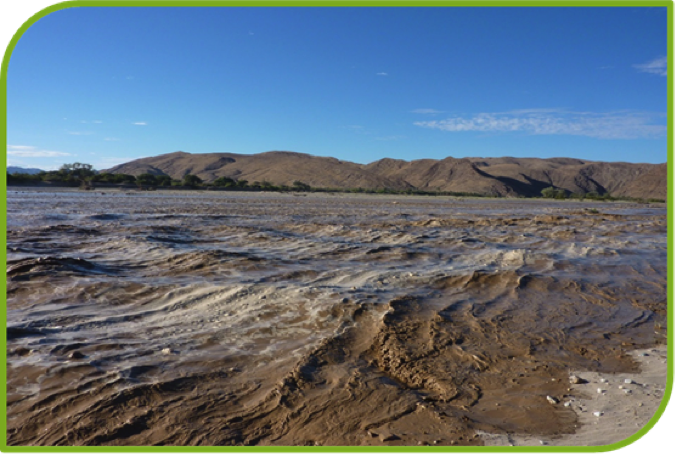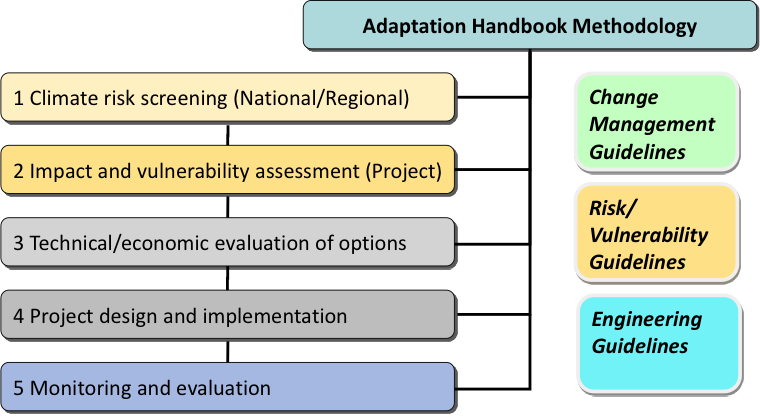Climate Adaption: Risk Management and Resilience Optimisation for Vulnerable Road Access in Africa
Climate in Africa is changing and the most immediate impact is from extreme climate events such as drought, floods, storms and cyclones. Knowledge on how this will adversely affect African Governments’ roads and transport is weak and there is no common guidance on how to best deal with climate effects at present and in the coming years.
Project Objectives
The overall objective of this AfCAP regional project, carried out by a consortium led by South Africa’s Council for Scientific and Industrial Research (CSIR), is to promote climate-resilient rural access in Africa through research and knowledge-sharing within and between the participating countries. The purpose is as follows:
Delivery of a research programme on activities relevant to climate adaptation and resilience strategies to enable national governments to take both short and longer term, policy-making action;
Development of an appreciation and awareness within African Road and Transport ministries, departments and agencies of current and future challenges associated with the effects of climate change on rural access, and an increased ability to deal with more unpredictable and extreme climate effects;
Trial and optimise best cost-benefit and return-on-investment approaches to demonstrate optimal resilient rural access and minimal impact on national economic progress;
Produce a Climate Adaptation handbook and guidelines; and
Implement a knowledge dissemination and capacity building programme.

Methodology and Phasing
All AfCAP partner countries have agreed to participate in this 32-month programme. In the first eight months (Phase 1), Climate Adaptation Guidelines were produced to initiate a sensitisation programme, linked to an introductory knowledge awareness raising and capacity building.
Phase 2 is focused on adaptation demonstrations, dissemination, capacity building and uptake. Training and capacity building will be important for:
- Understanding the challenges;
- Participation and knowledge sharing/exchange;
- Agreeing on methodologies and programmes for implementation of climate adaptation;
- Disseminating knowledge and experience.
The Project Team focuses on uptake and subsequent embedment of outcomes. This is addressed through a range of interventions from informing national policies, through regional and district planning, down to practical guidance on adaptation delivery at rural road level.
The project runs from April 2016 till December 2018.
Beneficiaries and Partner Countries
The main beneficiaries of the AfCAP regional project on Climate Adaptation are Sub-Saharan African Road and Transport Ministries, Departments and Agencies, as well as regional institutions, NGOs, universities and research organisations, and particularly those based in AfCAP partner countries.
Three partner countries have been selected to participate in specific demonstration trials to optimise approaches and deliver climate and social resilience. These are: Ethiopia (Eastern Africa), Mozambique (Southern Africa) and Ghana (Western Africa). The selection process of the partner countries is described in the project’s Inception Report.
Summary of Climate Adaptation Handbook and Guidelines
Based on a full needs assessment, research has been carried out into appropriate and economic methodologies for vulnerability and risk assessments; prioritisation of adaptation interventions; and optimisation of asset resilience in the context of rural access. In addition, evidence of cost, economic and social benefit links to rural communities arising from more resilient rural access is required to support wider policy adoption across Africa.
The project focusses on: (a) demonstrating appropriate engineering and non-engineering adaptation procedures; (b) sustainable enhancement in the capacity of three AfCAP partner countries; (c) sustainable enhancement in the capacity of additional AfCAP partner countries; and (d) uptake and embedment across AfCAP partner countries.
A Handbook has been developed to address climate adaptation in a new and practical way. It covers a wide range of climatic, geomorphologic and hydrological circumstances, based on application to Mozambique, Ghana and Ethiopia, but equally applicable to any Sub-Saharan African country. Produced for low volume roads, the principles also apply to high volume roads, although there will be differing priorities and design parameters.
There are three specific, overlapping applications of the Handbook: new infrastructure and structures, rehabilitation & retrofitting, and maintenance.
There are five stages in the adaptation process, as follows:

The Handbook sets out the overall approach and is supported by the following technical Guidelines.
- Change Management Guidelines;
- Climate Threats and Vulnerability Assessment Guidelines; and
- Engineering Adaptation Guidelines.
Project Resources and Reports
Milestones:
Climate Adaptation: Inception Report, May 2016
Climate Adaptation: Recommendations for Phase 2, February 2017
Climate Adaptation: Workshop reports Ethiopia, Ghana, Mozambique, March 2017
Climate Adatation: Inception Report Phase 2, August 2017
Climate Adaptation: Phase 2 Second Quarterly Report, December 2017
Climate Adaptation: Third Quarterly Progress Report, February 2018
Climate Adaptation: Fourth Quarterly Progress Report, May 2018
Climate Adaptation: Fifth Quarterly Progress Report, September 2018
Climate Adaptation: Sixth Quarterly Progress Report, January 2019
Climate Adaptation: Completion Report Phase 2, November 2019
Technical Reports:
Climate Threats Report, July 2016
Climate Adaptation Options Report, September 2016
Climate Adaptation: Final Report for Phase 1, March 2017
Management of Vulnerability and Adaptation toClimate Change: Ethiopia, December 2018
Management of Vulnerability and Adaptation to Climate Change: Ghana, December 2018
Management of Vulnerability and Adaptation to Climate Change: Mozambique, February 2019
Mohambe-Maqueze Demonstration Sections – Mozambique: Design and Construction Report, May 2019
Briefing Notes:
Climate Adaptation: Briefing Note 1, May 2016
Climate Adaptation: Briefing Note 2, October 2016
Climate Adaptation: Briefing Note 3, October 2016
Climate Adaptation: Briefing Note 4, January 2017
Climate Adaptation, Briefing Note 5, September 2017
Climate Adaptation, Briefing Note 6, January 2018
Climate Adaptation, Briefing Note 7, February 2019
Climate Adaptation, Technical Brief, October 2018
Handbook, Guidelines and Manuals:
Climate Adaptation Handbook, September 2019
Engineering Adaptation Guidelines, September 2019
Visual Assessement Manual, September 2019
Climate Risk and Vulnerability Assessment Guidelines, September 2019
Change Management Guidelines, September 2019
versions françaises:
Adaptation au climat: Gestion des risques et optimisation de résilience pour les accès routiers vulnerables en Afrique
Manuel d’adaptation au climat, septembre 2019
Lignes directrices pour l’adaptation de l’ingenierie, septembre 2019
Manuel d’évaluation visuelle, septembre 2019
Lignes directrices pour l’évaluation des risques et de la vulnérabilité climatiques, septembre 2019
External Resources
African Development Bank: Africa Climate Change Fund (ACCF), which aims to support African countries in their transition to a more climate-resilient and low-carbon mode of development.
World Bank: Climate Change and Africa: The World Bank’s climate strategy aims to help sub-Saharan countries lessen climate change impacts and their effect on economic development.
Intergovernmental Panel on Climate Change (IPCC): Climate Change 2007: Impacts, Adaptation and Vulnerability. Contribution of Working Group II to the Fourth Assessment Report of the Intergovernmental Panel on Climate Change.
Project team details
| Benoit Verhaeghe | bverhaeg@csir.co.za |
| Phil Paige Green | paigegreenconsult@gmail.com |
